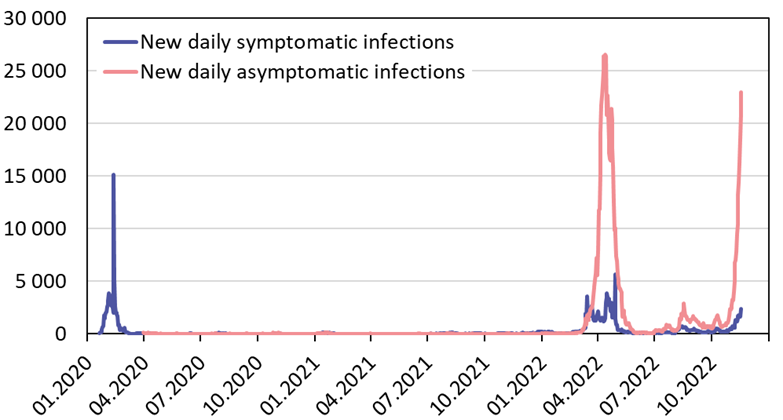BOFIT Weekly Review 46/2022
As the latest covid wave hits China, the government makes adjustments to covid rules
The number of confirmed covid cases has soared in recent weeks. The average daily number of confirmed covid infections exceeded 20,000 this week, with the lion’s share of infections being asymptomatic. No new covid deaths have been reported in China since last spring. While confirmed cases are now found in every province, about two-thirds of them have been identified in the southern province of Guangdong, China’s largest provincial economy. The provincial capital, Guangzhou, has imposed lockdowns of several districts. According to data compiled by Gavagal Draconomics, nearly all of China’s 100 largest cities surveyed were implementing tightened covid restrictions at the end of October. Such wide-scale restrictions were last seen in March. The current restrictions, however, are generally more relaxed than last spring.
Even as the latest covid wave has gathered steam, officials announced on November 11 a total of 20 covid rule changes designed to “optimise”, rather than phase out, zero-covid policies. The changes include a reduction of two days in the mandatory facility quarantine time for exposed individuals. Exposed persons now have to spend five days at an official quarantine facility and three more days in isolation at home. The same rule applies to people coming from abroad. The required two PCR negative tests to passengers has been reduced to one. Mass-testing of entire cities will now only be required in certain instances. Tracing of people who have been in close contact with a person exposed to covid-infected person has been suspended. Officials also emphasised the need for increased healthcare capacity, covid vaccinations and the availability of equipment for covid treatment. The local governments implemented new regulations immediately. For example, riders of public transport in Shijiazhuang are no longer required to show a negative covid test result. Pupils in Shanghai primary and middle schools are now only covid-tested three times a week, instead of five.
The economic consequences of China’s strict covid policies have been significant. They have interfered with the lives of people, broadly affected business operations and caused unrelenting uncertainty in all sectors of society. The new rules should somewhat ease the situation. While the rule changes are welcome, zero-covid policies remain in place. Officials say the changes are mainly intended to ease the situation for local governments as the old rules were extremely costly to implement. The new rules free up local government resources for more effective use. Many local governments were already stretched financially and drowning in debt before the covid pandemic. Their financial problems are evidenced, for example, in the accounts receivable of covid-test producers, which have doubled within a year to over 5 billion euros.
China has recently witnessed a new spike in its official covid infection figures.

Sources: China’s National Health Commission, CEIC and BOFIT.